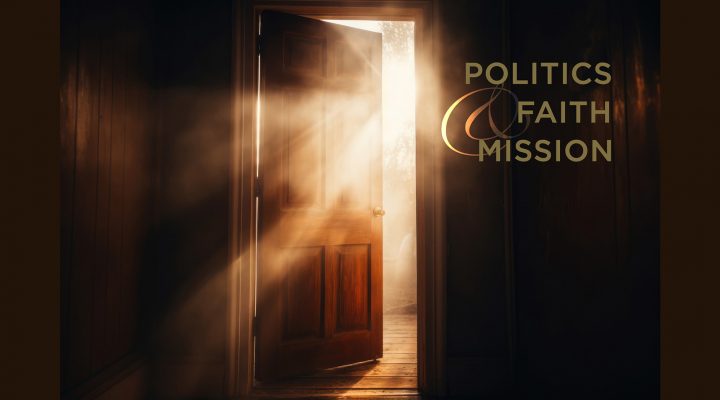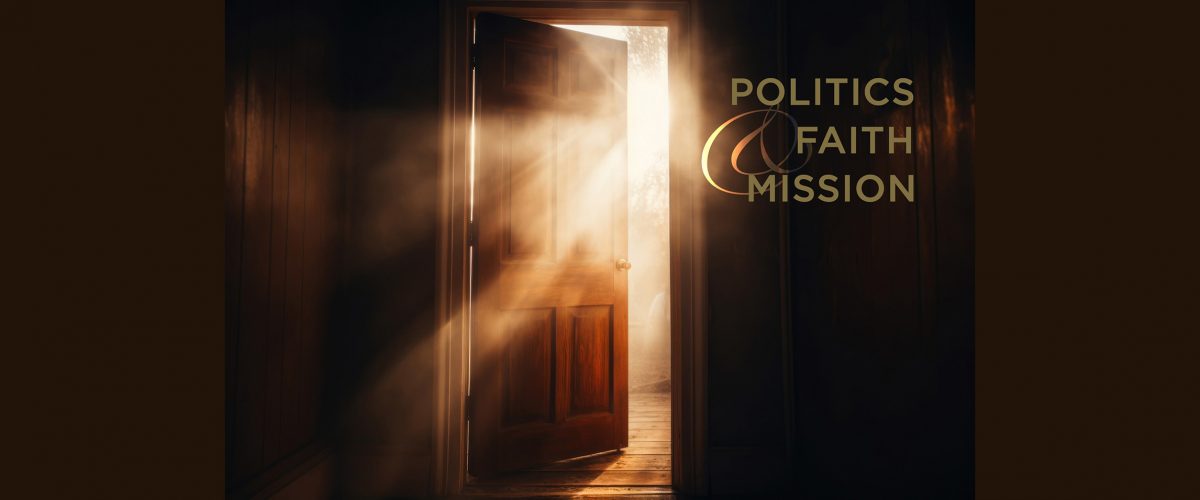Starlette Thomas is a preacher, an associate editor and the director of The Raceless Gospel Initiative at Good Faith Media and author of Take Me to the Water: The Raceless Gospel as Baptismal Pedagogy for a Desegregated Church. We had an amazing and deep conversation earlier in the year about James Baldwin, church and white privilege. It’s a joy now to share this deep conversation with her about her book, her work and the gifts of Blessed Howard Thurman.
Greg Garrett: Your book, Take Me to the Water, explores how the waters of baptism might be a part of helping us move past the failures of the North American church on race and segregation. Could you introduce my readers to your reasoning and maybe define for them the raceless gospel?
Starlette Thomas: I believe it all starts in the water for Christians, who identify as baptized believers and for what would later become the United States of America, which was kept afloat in its early days by monies made and resources gained by way of human trafficking and the enslavement of African and indigenous peoples.
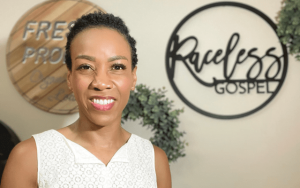
Starlette Thomas (Photo: GFM)
While it is tempting to wash our hands of history because “I wasn’t there” and “my family didn’t do it,” Take Me to the Water is an invitation to the North American church to come clean about its evil dealings with those racialized as Black, for providing pseudo-theological backing and cover for their brutalization, colonization and enslavement, for divinizing whiteness and demonizing blackness, for the “epidermalization of inferiority,” for the dehumanization of African and indigenous people groups explained as a missionary approach to “convert the heathen” population, for the manipulation of their relationship with the divine as European colonizers recreated themselves as masters and the go-between between God and God’s children, for racializing the gospel and endorsing a color-coded caste system that supports a hierarchy of identities to this day, for the segregation that began “down by the riverside” producing the Black and white church, and for continuing to toe “the color line” most visibly on Sunday mornings among other things.
I am inviting the institution to walk in accountability after hundreds of years of sinful laryngitis, to “name and claim” its role in oppressive systems and its part in the capitalist machinery. I understand it’s not a small ask or a simple task, but what is the point of the spiritual life if it is not transformative, if it does not reconcile all things?
I am convinced this is the work of baptism and the witness of baptismal freedom, that if we “wade in the water,” it will trouble our “relationships of ruling” and call into question the heresy of white supremacy.
In 1963, Dr. King remarked, “It is appalling that the most segregated hour of Christian America is 11 o’clock on Sunday morning.” But he also provided a charge: “The philosophy of Christianity is strongly opposed to the underlying philosophy of segregation. Therefore, every Christian is confronted with the basic responsibility of working courageously for a nonsegregated society. The task of conquering segregation is an inescapable must confronting the Christian churches.”
This is the work of North American Christians, who still suffer from the rippling effects of an ancestral and generational betrayal of baptismal identity and its efficacy to rid our society of segregation. Separate but equal on Sunday mornings, the North American church has yet to emerge as a baptized believer in the “kin-dom” of God.
“The raceless gospel is not a colorblind prescription or a post-racial vision.”
My conviction is that the raceless gospel expressed through baptismal identity can act as a catalyst for desegregating sacred space. But the water must trouble baptized believers who come up from it and reenter a world that does not treat everyone equally.
To be sure, the raceless gospel is not a colorblind prescription or a post-racial vision, denying America’s history of violent oppression, marginalization, minoritization and injustice against people recreated as colors: beige, that is mixed race, Black, brown, red and yellow.
I’m not singing “Kumbaya” but calling for a come-to-Jesus meeting. It is a message that goes back to a creation narrative and Jesus’ words, to the story of the Spirit hovering over the water and a conversation between Jesus and Nicodemus. Jesus says to him, “You must be born again.” Nodding in agreement while eavesdropping on this conversation, I am taking the North American church back to the water.
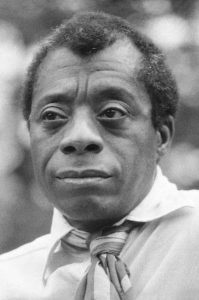
James Baldwin
GG: We talked earlier this year about Blessed James Baldwin, and one of the saints you return to often in this book is Blessed Howard Thurman. What are some of the essential messages Thurman has for the church and for individual believers?
ST: This is a difficult task as I can offer no true summary. To read Thurman is to contribute to your undoing, your unraveling of whatever you hold tight — for good or for ill. You read Thurman and it doesn’t take long to realize he is reading you.
Line upon line, he somehow gets through to the heart of the matter, for which he offers Meditations of the Heart. It is for the sake of conversion, metamorphosis, evolution with questions like, “Who am I, really?” It is for the purpose of raising your level of awareness, of elevating your consciousness so that you can hear your moral assignment with books like The Inward Journey. In it, he wrote, “We are always surrounded by persons, forces and objects which lay siege to us and seek to make of us means to their ends or at least to their fulfillment. The demand is ever present to distinguish between the self and the not-self.”
For those creatives, budding contemplatives and mystics, for those questioning the efficacy of religious traditions and systems, for those whose “backs are against the wall,” Dr. Thurman offers readings that have secret passageways. You turn a page and arrive at the depths of what it means to be a human being.
“I have always wanted to be me without making it difficult for you to be you,” he wrote in The Search for Common Ground. You get a taste of what your soul has been longing for. Deep is the Hunger presents itself like a book of extended proverbs. In a meditation on “the working paper” he wrote, “For every man, there is a necessity to establish as securely as possible the lines along which he proposes to live his life.”
This is a throughline in many of his writings, described as “working papers for commitment,” in Disciplines of the Spirit, this work of the private and interior life. It is the work of becoming, of soul blossoming, of contributing to a purpose that is larger than life and yet intimately connected to all of life. It is to work out our salvation, our deliverance from a myriad of human oppressions — from being tongue-tied to being mentally, physically, socially, geographically and economically confined by one word or another.
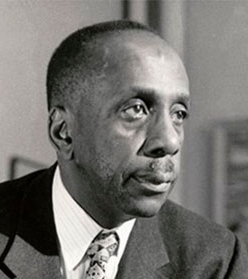
Howard Thurman
In The Creative Encounter, he wrote, “As a person, each of us lives a private life; there is a world within where for us the great issues of our lives are determined.” This inner working for outward transformation is important and goes against this notion of solo salvation, that is Jesus is my personal Lord and Savior. Instead, Dr. Thurman gives the North American church its marching orders for communal salvation in Jesus and the Disinherited asking, “Why is it that Christianity seems impotent to deal radically, and therefore effectively, with the issues of discrimination and injustice on the basis of race, religion and national origin? Is this impotency due to a betrayal of the genius of the religion or is it due to a basic weakness in the religion itself?”
Sometimes, the question is the answer. Ask it.
The goal is all-togetherness, “whole-making,” community as he outlines for himself in Footprints of a Dream. But I would be remiss if I did not name the work of The Luminous Darkness: A Personal Interpretation of the Anatomy of Segregation and the Ground of Hope. Thurman makes connections without concern for the church’s pride or need to keep up appearances. He shatters its image of perfection, if ever there was one. He names the pursuit of power and the desire to center one’s self at the expense of marginalizing others. The crisis of identity that is created in being Black and white, these social colors, is stated pointedly, writing, “The burden of being Black and being white is so heavy that it is rare in our society to experience oneself as a human being.” It is clear to Thurman that even these racialized identities are themselves segregating and out of touch with a person’s reality of being.
GG: I was rescued by a historically Black church in East Austin that decided they would welcome everyone Spirit sent their way, but I have also talked to folks who believe the Black church is a necessary safe space for people who’ve been marginalized and tormented. How do you wrestle with the call Thurman made for the Black church to reach out to white Christians and that desire to have a place of security on Sunday morning?
“I’m not a member of a church, and I don’t plan to join one until the North American church desegregates.”
ST: There is no back and forth for me. I walk with both Howard Thurman and Harriet Tubman, who both inspired me to self-emancipate from the racialized reality years ago. I’m not a member of a church, and I don’t plan to join one until the North American church desegregates. Instead, I go back and pass notes to those who want to be free from white supremacy. The North American church has not been delivered from it.
I write for a future church and leave instructions for the present one with the hope that some will meet us there. It is the church that has reconciled its differences by divesting of the authority of white supremacy, patriarchy, capitalism and its progeny. It is the church that has made reparations and destroyed images of the divine in white face. It is the church that has embodied liberation by putting its body on the line and that stands on the front lines in protests and demonstrations calling for justice. It is the church that has moved past annual pulpit swaps to weekly fellowship meals, filled with people who pass the gravy — not just a check.
The raceless gospel is not a call for white flag waving but an invitation to do the personal and familial work of spiritual formation that requires decolonizing and deracializing one’s identity for the sake of safe and authentic fellowship. Thurman names the required belief in the inherent dignity of all people in Footprints of a Dream: The Story of the Church for the Fellowship of All Peoples. Frankly, not all Christians believe that and thus, these churches are not safe spaces.
Consequently, so long as people profess a belief in white supremacy, coddle and elect to public office those who perform it, gaslight and spiritually bypass those who are victimized by it or tend to structures that maintain it, bodies racialized as black and brown are not safe and there will remain a need for the Black church.
So long as people see themselves as an intermediary for God, as a substitute savior, who offer salvation by way of assimilation, there will be a need for the Black church.
So long as people are not free to worship the God of their salvation on their terms and in their own way, there will be a need for the Black church.
So long as American society attempts to dehumanize African Americans, diminish their opportunities to experience the fulness of life and deny their innate sense of somebodiness, there will be a need for the Black church. It remains for the safety of their bodies.
“There was a call for forgiveness before their bodies had cooled, but what of the work to exorcise the demon of white supremacy?”
We know most African American Christians embody the spirit of hospitality and welcome people into what they believe is God’s house with sometimes devastating consequences as was the case for the Emanuel Nine, whose bowed heads were aimed at by Dylan Roof. And as is customary, there was a call for forgiveness before their bodies had cooled, but what of the work to exorcise the demon of white supremacy?
Because “Christians are supposed to forgive” but what are they called to do about race, racism and stereotyping? And why can lessons on forgiveness and reconciliation only be taught by the example of murdered African Americans?
A four-week “cross-cultural” Bible study, a book club, a community day, a conference, a workshop or an MLK Day worship service is not enough time to change the hearts and minds of individuals. It must be an ongoing, personal work and a personal decision without handwringing or handholding.
GG: You define white Christian nationalism several times in Take Me to the Water — maybe most chillingly when you describe how these folks believe that “the power of God is reserved solely for America’s protection and the annihilation of its enemies.” What concerns you most about white Christian nationalism? What would you say are some of our ways past or through this present heresy?
ST: What concerns me most about white Christian nationalism is its propensity toward violence that has been historically directed at African American people and the complicit silence that enables it. It’s also the ingredients that go into it that are the most disheartening and distasteful: the twisting of Scripture, the fear, the hatred, the lie of scarcity, the denial of common humanity, the whataboutism, the false binary thinking of us versus them, the hopelessness, the sermons, the songs, the pledges, the speeches, the chants, the signs and all those who just go along to get along. No matter what their leaders promise, it will never turn out right. Because there’s nothing good in it or about it.
This heresy is corrected through truth-telling: Set your intentions, be honest and straightforward, trust yourself, ask questions and write it all down.
“Even when they call your truth a lie, tell it anyway!”
“Even when they call your truth a lie, tell it anyway! Tell it anyway!” Rev. Dr. Katie Cannon told us: Tell the truth until it hurts and until they are red in the face. Then, tell a little bit more. Tell the truth and hold space for other stories, experiences and realities.
“Speak the truth in love,” Paul told the church at Ephesus. So, tell the truth, take up time and space. Tell the truth and bear witness to our shared reality. Tell the truth because white Christian nationalism espouses false teachings and works against the unity of believers. It’s not just hearsay, so also take it seriously when you hear it.
GG: In each of these interviews, I ask folks what is giving them hope just now. For me, it’s always James Baldwin, my students, some good ’70s soul and funk. What are you reading, listening to or seeing that brings you hope in 2024?
ST: What gives me hope is the work and witness of Harriet Tubman and Howard Thurman, both of whom I’m on a mystical journey with, my local pond that doubles as a reflection pool, The Raceless Gospel Initiative and my “working papers.”
Greg Garrett teaches creative writing, film, literature and theology classes at Baylor University. He is the author of two dozen books of fiction, nonfiction, memoir and translation, including the critically acclaimed novels Free Bird, Cycling, Shame and The Prodigal. His latest novel is Bastille Day. He is one of America’s leading voices on religion and culture. Two of his recent nonfiction books are In Conversation: Rowan Williams and Greg Garrett and A Long, Long Way: Hollywood’s Unfinished Journey from Racism to Reconciliation. He is a seminary-trained lay preacher in the Episcopal Church. He lives in Austin with his wife, Jeanie, and their two daughters.
More from this series:
Politics, faith and mission: A conversation with Samuel Perry
Politics, faith and mission: A conversation with Jimi Calhoun
Politics, faith and mission: A conversation with David Dark
Politics, faith and mission: A conversation with Randolph Hollerith
Politics, faith and mission: A conversation with Jillian Mason Shannon
Politics, faith and mission: A conversation with Bishop Mariann Edgar Budde
Politics, faith and mission: A conversation with Vann Newkirk II
Politics, faith and mission: A conversation with Sarah McCammon
Politics, faith and mission: A conversation with Winnie Varghese
Politics, faith and mission: A conversation with Kaitlyn Schiess
Politics, faith and mission: A conversation with Russell Moore
Politics, faith and mission: A BNG interview series on the 2024 election and the Church
Politics, faith and mission: A talk with Tim Alberta on his book and faith journey
Politics, faith and mission: A conversation with Jemar Tisby
Politics, faith and mission: A conversation with Leonard Hamlin Sr.
Politics, faith and mission: A conversation with Ty Seidule
Politics, faith and mission: A conversation with Jessica Wai-Fong Wong
Politics, faith and mission: A conversation with Brian McLaren

